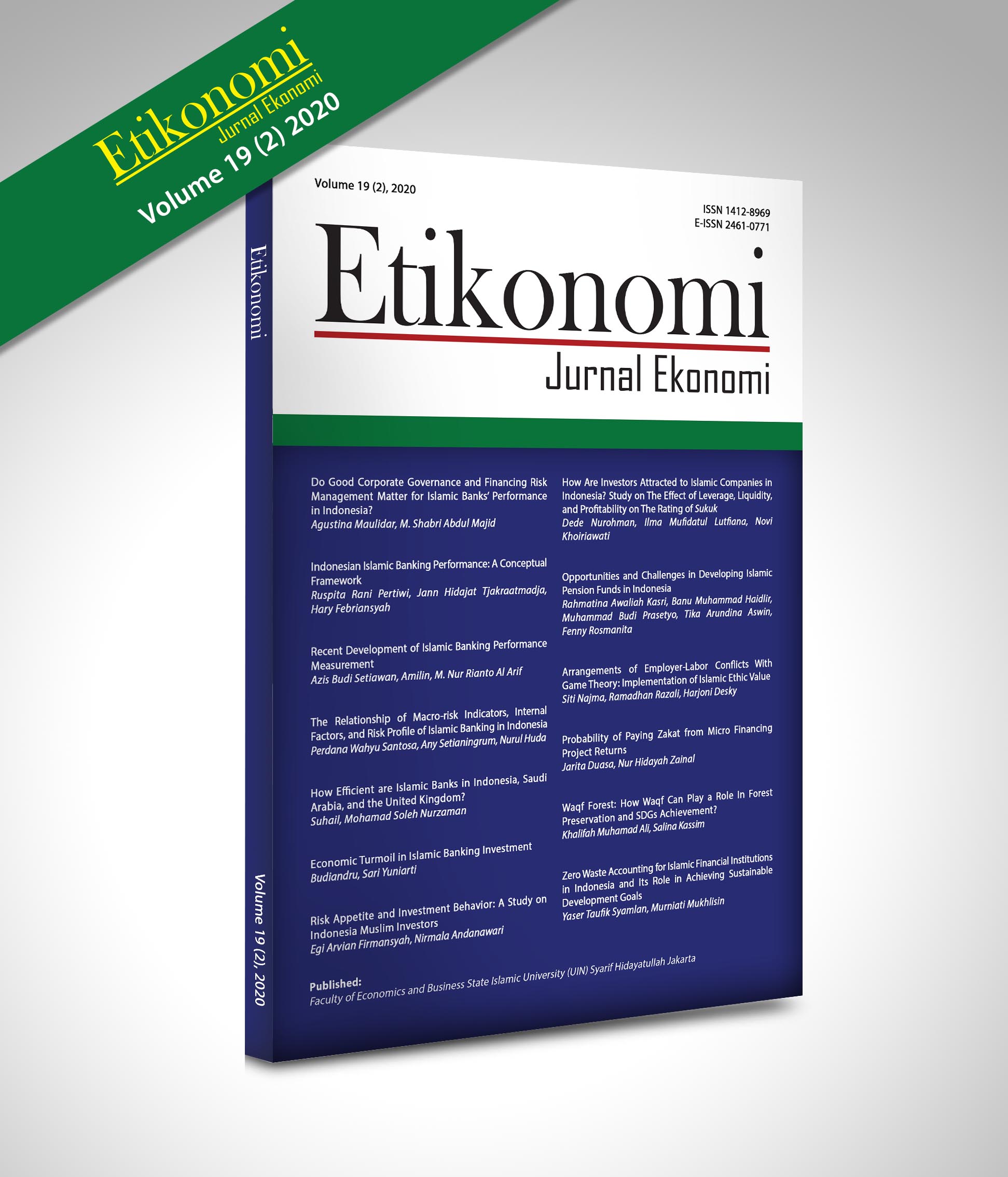Zero Waste Accounting for Islamic Financial Institutions in Indonesia and Its Role in Achieving Sustainable Development Goals
DOI:
https://doi.org/10.15408/etk.v19i2.15538Keywords:
zero waste accounting, Islamic financial institutions, SDGsAbstract
This study aims to propose a model of Zero Waste Accounting in Islamic Financial Institutions in Indonesia and how it is relevant to the achievement of Sustainable Development Goals (SDGs). Due to the nature of the research that is exploration thus the research adopts interpretative approach that is essential to validate the research with “convincingness” approach rather than positivist measures of the reliability, validity of data and the generalization of results. The finding documents that Zero Waste Accounting is in vein with the spirit of Maqashid ul-Shariah that has been embedded as a part of the purpose of Islamic financial institution establishment. Statement of Sources and Uses of Zero Waste Accounting should become one of the additional disclosures. The paper sheds a light the need on Zero Waste Accounting for the accounting standard setters.
JEL Classification: G20, G52, Q56
How to Cite:
Syamlan, Y. T., & Mukhlisin, M. (2020). Zero Waste Accounting in Islamic Financial Institutions in Indonesia and Its Role in Achieving Sustainable Development Goals. Etikonomi: Jurnal Ekonomi, 19(2), 365-382. https://doi.org/10.15408/etk.v19i2.15538.
Downloads
References
Abdurrachman, A. (2008). Prosedur Penetapan Keputusan Fatwa Dewan Syariah Nasional (Procedure for Determining Decision of the National Sharia Council Fatwa). Al-Mawarid, XVIII, 31-40.
Abdullah, S. & Furqani, H. (2012). The Objectives of Shariah (Maqasid Shariah) in Takaful: Highlighting The Noble Practice. International Conference on Management, Economics and Finance 2012. Kuala Lumpur.
Agustia, D., Tjiptohadi S and Wiwiek D. (2018). The Mediating Effect of Environmental Management Accounting on Green Innovation - Firm Value Relationship. International Journal of Energy Economics and Policy, 9(2), 299-306.
Alsharari, N. M., & Al-Shboul, M., (2019). Evaluating Qualitative Research in Management Accounting Using the Criteria of “Convincingness”. Pacific Accounting Review, 31(1), 43-62.
Andreeva, O. V., Vovchenko, N. G., Ivanova, O. B., & Kostoglodova, E. D. (2018). Green Finance: Trends and Financial Regulation Prospects. In: Grima, S. and Thalassinos, E. (eds). Contemporary Issues in Business and Financial Management in Eastern Europe, Contemporary Studies in Economic and Financial Analysis, 100 (1), Emerald Publishing Limited, 9-17. https://doi.org/10.1108/S1569-375920180000100003.
Ascarya. (2017). Integrasi Keuangan Komersial dan Sosial Islam (Integration of Islamic Commercial and Social Finance). Presented in Festival Ekonomi Syariah Regional Sumatera.
Barker, R. (2019). Corporate Natural Capital Accounting. Oxford Review of Economic Policy, 35(1), 68–87. https://doi.org/10.1093/oxrep/gry031.
Berg, A., Antikainen, R., Hartikainen, E., Kauppi, S., Kautto, P., Lazarevic, D., Piesik, S., & Saikku, L. (2018). Circular Economy for Sustainable Development. Reportt of the Finisih Environment Institute 26.
Biswas, N. (2011). Sustainable Green Banking Approach: The Need of the Hour. Business Spectrum, 1(1), 32-38.
Chapra, U. (2008). The Islamic Vision of Development in the Light of Maqasid Al-Shariah. London: IIIT.
Fleischman, R. K., & Schuele, K., (2006). Green accounting: A Primer. Journal of Accounting Education, 24(1), 35-66.
Gallhofer, S., & Haslam, J. (1997). The Direction of Green Accounting Policy: Critical Reflections. Accounting, Auditing & Accountability Journal, 10(2), 148-174. https:// doi.org/10.1108/09513579710166703.
Haniffa, R. & Hudaib, M. (2007). Exploring the Ethical Identity of Islamic Banks via Communication in Annual Reports. Journal of Business Ethics, 76(1), 97-116. https://doi.org/10.1007/s10551-006-9272-5.
Hossain, D. M., Al Bir, A. T. S., Tarique, K. M., & Momen, A. (2016). Disclosure of Green Banking Issues in the Annual Reports: A Study on Bangladeshi Banks. Middle East Journal of Business, 11(1), 1-12.
Islam, S. M., & Das, P. C. (2013). Green Banking Practices in Bangladesh. IOSR Journal of Business and Management (IOSR-JBM), 8(3), 39-44.
Klapper, L., El-Zoghbi, M., & Hess, J. (2016). Achieving the Sustainable Development Goals The Role of Financial Inclusion. Working paper of United Nations Secretary-General’s Special Advocate for Inclusive Finance for Development.
Lahti, T., Wincent, J., & Parida, V., (2018). A Definition and Theoretical Review of The Circular Economy, Value Creation, and Sustainable Business Models: Where are We Now and Where Should Research Move in the Future?. Sustainability, 10(8), 2799.
Minimol, M. C., & Makesh, K. G. (2014). Green Accounting and Reporting Practices among Indian Corporates. Asia Pacific Journal of Research, 1, 51-60.
Muller, D. B. (2018). Circular Economy and The Sustainable Economy Goals. NTNU Industrial Ecology. Presented in Circular Economy Conference Trondheim 2018.
Mukhlisin M., Tamanni, L. Azid, T., Mustafida, R. (2020), Contribution of Islamic Microfinance Studies in Achieving SDGs, In: Elzahi Saaid Ali A., Ali K., & Khaleequzzaman, M (eds.). Enchancing Financial Inclusion Through Islamic Finance, Volume 1. Palgrave Studies in Islamic Banking, Finance, and Economics. London: Palgrave Macmillan.
Ng, A. W. (2018). From Sustainability Accounting to a Green Financing System: Institutional Legitimacy and Market Heterogeneity in a global financial centre. Journal of Cleaner, 195, 585-592.
Owen, D., Gray, R., & Bebbington, J. (1997). Green Accounting: Cosmetic Irrelevance or Radical Agenda for Change?. Asia-Pacific Journal of Accounting, 4(2), 175-198. https://doi.org/10.1080/10293574.1997.10510519.
Schroeder, P., Kartika. A., & Weber, U., (2018). The Relevance of Circular Economy Practices to the Sustainable Development Goals. Journal of Industrial Ecology, 23(1), 77-95. https://doi.org/10.1111/jiec.12732.
Subhan, M. (2015). Pemikiran Ekonomi Yahya Bin Umar Dalam Perspektif Ekonomi Modern (Yahya Bin Umar's Economic Thinking in a Modern Economic Perspective). Ulumuna, 1(1), 84-97.
Yunus, M. (2007) Creating a World without Poverty: Social Business and the Future of Capitalism. New York: Public Affairs.










